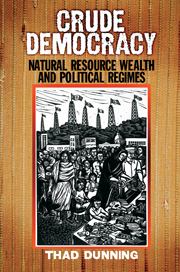Book contents
- Frontmatter
- Contents
- List of Figures
- List of Tables
- Preface and Acknowledgments
- Crude Democracy: Natural Resource Wealth and Political Regimes Cambridge
- 1 DOES OIL PROMOTE DEMOCRACY?
- 2 THE FOUNDATIONS OF RENTIER STATES
- 3 RESOURCE RENTS AND THE POLITICAL REGIME
- 4 STATISTICAL TESTS ON RENTS AND THE REGIME
- 5 THE DEMOCRATIC EFFECT OF RENTS
- 6 RENTIER DEMOCRACY IN COMPARATIVE PERSPECTIVE
- 7 THEORETICAL EXTENSIONS
- 8 CONCLUSION: WHITHER THE RESOURCE CURSE?
- Appendix: Construction of the Simulations
- Bibliography
- Index
1 - DOES OIL PROMOTE DEMOCRACY?
Published online by Cambridge University Press: 17 July 2009
- Frontmatter
- Contents
- List of Figures
- List of Tables
- Preface and Acknowledgments
- Crude Democracy: Natural Resource Wealth and Political Regimes Cambridge
- 1 DOES OIL PROMOTE DEMOCRACY?
- 2 THE FOUNDATIONS OF RENTIER STATES
- 3 RESOURCE RENTS AND THE POLITICAL REGIME
- 4 STATISTICAL TESTS ON RENTS AND THE REGIME
- 5 THE DEMOCRATIC EFFECT OF RENTS
- 6 RENTIER DEMOCRACY IN COMPARATIVE PERSPECTIVE
- 7 THEORETICAL EXTENSIONS
- 8 CONCLUSION: WHITHER THE RESOURCE CURSE?
- Appendix: Construction of the Simulations
- Bibliography
- Index
Summary
The concept of a “crude democracy”—that is, a democracy fostered, supported, or sustained by oil wealth—is counterintuitive. Political scientists, policymakers, and pundits often assert that where oil or certain other natural resources are bountiful, democracy is not. Rulers of many resource-rich countries, from the Arabian Peninsula to the former Zaire, appear to have had great success in consolidating stable authoritarian polities; elsewhere, conflict over the distribution of resource revenues has seemed to promote political instability or even civil war but certainly not democratic regimes. In the aftermath of the U.S.-led invasion of Iraq in March 2003, for example, though some observers hoped Iraq's petroleum could be harnessed to pay for reconstruction and then to finance a stable democracy, other analysts worried that conflict over the division of oil revenues would inflame sectarian and regional tensions and ultimately undermine the prospects for democracy. The experience of many other resource-rich countries contributes to a pessimistic evaluation of democracy's chances in countries rich in natural resources. Commenting on the apparently robust association between oil wealth and autocracy, New York Times columnist Thomas Friedman pronounced a “First Law of Petropolitics” in the pages of the journal Foreign Policy: “The price of oil and the pace of freedom always move in opposite directions in oil-rich petrolist states” (Friedman 2006).
- Type
- Chapter
- Information
- Crude DemocracyNatural Resource Wealth and Political Regimes, pp. 1 - 36Publisher: Cambridge University PressPrint publication year: 2008



